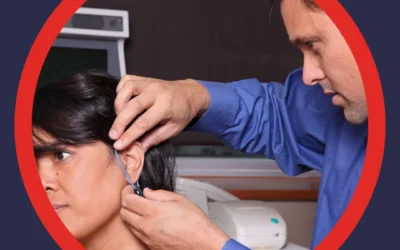Best Hearing Aids for Elderly People: Enhance Your Golden Years
Hearing loss is common among seniors, affecting their quality of life. The best hearing aids for elderly individuals can significantly enhance their well-being.
Why Hearing Aids Are Important for Seniors
Hearing aids play a critical role in the lives of seniors. They offer numerous benefits that greatly enhance their quality of life, psychological health, and overall well-being. Here’s why hearing aids are essential for seniors:
Improving Quality of Life
Hearing aids can transform seniors’ daily lives. Clearer hearing allows them to engage fully in conversations, enjoy music, and participate in activities they love. This improved engagement can lead to a more fulfilling and active lifestyle.
Enhancing Social Interaction
Hearing loss can make social interactions challenging, leading to withdrawal and isolation. Hearing aids enable seniors to hear and communicate better, making socializing easier and more enjoyable. This fosters stronger relationships with family and friends.
Increasing Safety
Hearing aids enhance awareness of environmental sounds, such as alarms, traffic, and other warning signals. This increased awareness can significantly reduce the risk of accidents and falls, contributing to greater safety and independence.
Supporting Cognitive Health
Research suggests a link between untreated hearing loss and cognitive decline, including dementia. By improving hearing, hearing aids can help maintain cognitive functions and delay the onset of cognitive decline. This supports overall brain health and mental sharpness.
Boosting Emotional Well-Being
Untreated hearing loss can lead to feelings of frustration, embarrassment, and depression. Hearing aids help seniors communicate more effectively, boosting their confidence and reducing feelings of isolation and sadness. This leads to improved emotional health and a more positive outlook on life.
Facilitating Better Communication
Effective communication is vital for maintaining relationships and engaging in community activities. Hearing aids provide clarity in conversations, reducing misunderstandings and ensuring that seniors can actively participate in discussions and social events.
Health Benefits of Hearing Aids
Hearing aids offer specific health benefits that address the challenges posed by hearing loss:
- Reduced Cognitive Load: Hearing aids reduce the mental effort required to listen and understand speech. This alleviates cognitive fatigue, allowing seniors to use their mental resources more efficiently.
- Improved Brain Health: Hearing aids help prevent brain atrophy associated with hearing loss by keeping the auditory pathways active. This can reduce the risk of developing conditions like dementia and Alzheimer’s disease.
- Enhanced Mental Health: Addressing hearing loss can alleviate symptoms of anxiety and depression. Hearing aids enable seniors to engage more fully in life, promoting well-being and reducing mental health issues.
- Better Physical Health: Improved hearing can lead to increased physical activity. Seniors who hear well are more likely to participate in exercise and outdoor activities, contributing to better overall physical health.

Social and Lifestyle Benefits
Hearing aids also offer several social and lifestyle benefits:
- Increased Participation in Social Activities: With better hearing, seniors can join social gatherings, clubs, and events, fostering a sense of community and belonging.
- Enhanced Entertainment Enjoyment: Hearing aids strengthen the pleasure of watching TV, listening to music, and attending theater performances.
- Greater Independence: Improved hearing allows seniors to handle daily tasks more independently, such as shopping, attending appointments, and using public transportation. This autonomy boosts their confidence and quality of life.
Investing in Hearing Aids
Investing in hearing aids can significantly enhance the quality of life for seniors, making their golden years more enjoyable and fulfilling. By addressing hearing loss, seniors can stay connected, active, and engaged, leading to a happier and healthier life.
Top-Rated Hearing Aids for Seniors Today
Several top-rated hearing aids cater specifically to the needs of seniors. Here are some leading options:
Phonak Audéo Lumity
Features: Advanced sound processing, personalized hearing experience, excellent noise reduction.
Benefits: Clear sound, reduced listening effort, improved speech understanding. Forbes Health recommended it.
User Review: “Clear and crisp sound with natural quality and excellent Bluetooth connectivity.”
Resound One
Features: Smart hearing technology, rechargeable options, customizable listening programs.
Benefits: Comfortable, discreet, with advanced features.
User Review: “Elegant design and reliable sound quality, great for background noise management.”

Starkey Livio Edge AI
Features: AI for personalized listening, fall detection, and smart home integration.
Benefits: Advanced features, enhanced safety, clear and natural sound.
User Review: “Best for custom mold hearing aids, great for active lifestyles.”
These hearing aids offer various features to suit different needs and budgets. Consult with an audiologist to find the most suitable option.
Best Hearing Aids for Active Seniors
Active seniors need durable, comfortable hearing aids that handle different environments. The models above are also the best hearing aids for elderly people who are active because they contain the essential features below:
- Water resistance: Essential for activities like swimming or gardening.
- Durability: Sturdy build for an active lifestyle.
- Battery life: Rechargeable options or long-lasting batteries.
- Secure fit: Prevents hearing aids from falling during physical activities.
- Noise reduction: Improves sound quality in noisy environments.
Active people of all ages will utilize these features, but those who are very elderly may have different priorities.
Hearing Aids for Very Elderly Individuals
For those aged 80 and above, simplicity, durability, and comfort are crucial. The following factors should be prioritized to ensure the best experience:
Key Considerations
- Ease of Use: Simple controls and intuitive interfaces are essential. Large buttons and visual indicators can help.
- Durability: Hearing aids should be resistant to damage and easy to clean. Robust construction can withstand accidental drops.
- Comfort: A secure and comfortable fit is crucial for long-term wear. Soft materials and ergonomic designs enhance comfort.
- Loud and Clear: Amplification should be sufficient for individuals with significant hearing loss. High-quality speakers ensure clarity.
- Emergency Features: Some hearing aids offer fall detection or emergency alerts, which can provide peace of mind for users and their families.
Recommended Styles
- Behind-the-Ear (BTE): Often the most durable and offers a broader range of features.
- Receiver-in-Canal (RIC): Provide a good balance of comfort and performance.
Specific Features to Look For
- Large Buttons: Easy to operate for individuals with dexterity challenges.
- Visual Indicators: Clear battery status indicators and other visual cues.
- Robust Build: Durable materials and construction to withstand accidental drops.
- Telecoil: Useful for accessing assistive listening devices in public places.
- Compatibility with Assistive Listening Devices: Ensure compatibility with other assistive technologies.
Service Options to Look For
- Professional Fitting: Schedule a comprehensive hearing evaluation to determine the best hearing aid options.
- Consider a Trial Period: Many hearing aid providers offer trial periods to allow for adjustments and ensure satisfaction.
- Explore Financing Options: Some hearing aid providers offer options for buying hearing aids without insurance and work with major hearing aid insurance companies.
By carefully considering these factors and seeking professional guidance, you can find the ideal hearing aid to improve the quality of life for a loved one.
Telehealth and Remote Hearing Aid Adjustments
Remote hearing care features are ideal for seniors seeking convenience and ongoing support. Hearing aids with robust remote care capabilities ensure continuous, personalized assistance without the need for frequent in-person visits.
Essential Features for Remote Care
- Smartphone App Compatibility: The app allows audiologists to make remote adjustments and troubleshoot. Users can make real-time changes from the comfort of their homes.
- Data Collection: Hearing aids should collect data on usage patterns, listening environments, and battery life. This data helps audiologists provide precise adjustments.
- Remote Programming: Audiologists can adjust hearing aid settings without in-person visits, ensuring quick and efficient problem resolution.
- Telehealth Integration: Seamless integration with telemedicine platforms for virtual appointments. Users can consult with their audiologist from anywhere.
- Clear Communication: Ensure the hearing aid manufacturer and your audiologist have a solid remote care infrastructure.
- Reliable Internet Connection: A stable internet connection is crucial for successful remote appointments.
- User-Friendly App: A simple and intuitive smartphone app enhances the user experience.
By choosing hearing centers with robust remote care features, seniors can benefit from ongoing support and adjustments without the need for frequent in-person visits. This ensures continuous, personalized assistance and enhances the overall user experience.
Real Stories from Our Patients
Hearing aids have profoundly impacted the lives of many seniors. Here are some real stories from our patients at American Hearing + Audiology.
Kelly R. shared, “I used to ask people to repeat things and constantly turned up the TV volume. I worried hearing aids would make me look old. The office staff made me feel comfortable, and my audiologist was so knowledgeable. I love my hearing aids! They changed my life, and now I can hear conversations without embarrassment.”
Dennis C. said, “From the moment I walked in, I was impressed. The receptionist was welcoming and helpful. Dr. Sara Otte was friendly, listened to my concerns, and explained everything clearly. She reviewed my test results and hearing aid options thoroughly. Her professionalism and personality gave me confidence. I highly recommend Dr. Otte and the office.”
An NIH study supports these experiences, showing that hearing aids alleviate cognitive fatigue and failures in seniors with mild to moderate hearing loss. This underscores the importance of hearing aids in improving cognitive health and overall quality of life.
At American Hearing + Audiology, we believe everyone deserves quality hearing options. Contact us today to enhance your golden years with the right hearing aid and enjoy a fuller, more active life.



